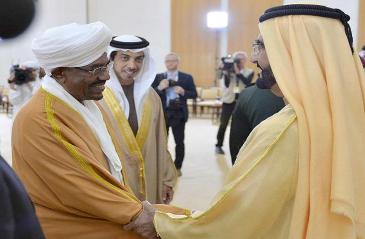Sudan’s FM says Bashir’s visit to UAE “non-political”
February 25, 2015 (KHARTOUM) – Sudanese president Omer Hassan al-Bashir and his accompanying delegation have concluded a four-day visit to the United Arab Emirates (UAE).

Even though this visit was labelled as an official one, there were signs of reservations on the part of Abu Dhabi as few high-level meetings took place between the delegation and UAE officials.
Bashir met with Abu Dhabi crown prince Mohammed bin Zayed al-Nahyan and UAE vice-president Mohammed bin Rashid al-Maktoum only on the sidelines of the International Defence Exhibition & Conference (IDEX), which is a biennial arms and defence technology sales exhibition.
Sudan’s foreign minister Ali Karti told reporters upon arrival at Khartoum airport that the visit covered several areas except political issues.
He denied that talks with UAE officials discussed the Libyan crisis, adding the issue had been addressed ahead of the visit.
In an interview with the Abu-Dhabi based al-Etihad newspaper on Sunday, Bashir disclosed that his country is coordinating with the UAE to contain the explosive situation in Libya and ensure that the conflict does not expand.
He warned of the seriousness of the Libya fighting on the region and its effects on security and stability, saying his government worked with all parties to contain the crisis in Libya and noted that a joint Sudanese-Libyan border force was established.
Karti said the Sudanese ministers accompanying Bashir didn’t hold joint talks with their UAE’s counterparts because the visit program was not planned this way and also to allow for mutual visits between the two sides.
He pointed the delegation held considerable discussion with the UAE officials about investment in Sudan, describing the meetings as “good”.
The Sudanese foreign minister said the visit opened a wide door for future bilateral talks, stressing it came after a period of strain relations due to differences in political stances which requires further dialogue.
Karti also pointed out that dialogue which took place in the two countries prior to the visit led to the convergence of views of the two sides in a number of regional and security issues and paved the way for the visit.
He added that the ministers of the economic sector and heads of economic corporations who accompanied the president had the opportunity to hold discussion with the UAE officials on investment and the shared economic interests.
“That means the visit went beyond [addressing] security issues to [discussing] common interests,” he added.
Karti also said the meeting of Bashir with the Sudanese community in the UAE offered clear answers to issues of concern to the Sudanese working abroad besides reflecting the political and economic conditions in the country.
Bashir’s visit is believed to be his first official trip to UAE since 2008.
The relationship between the two countries has evolved with ups and downs over the last two decades.
In 1992, Abu Dhabi expelled the Sudanese ambassador and six other diplomats. The UAE has refused subsequent requests to restore full diplomatic relationship until 1999.
But relations have quietly deteriorated as Khartoum’s links with Iran strengthened. UAE is in a long-standing territorial dispute with Iran over the three Gulf islands of Abu Musa and Greater and Lesser Tunb.
Iran refuses international arbitration over the dispute and insists that its sovereignty over the islands is non-negotiable.
(ST)
